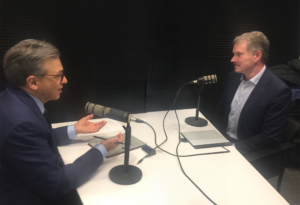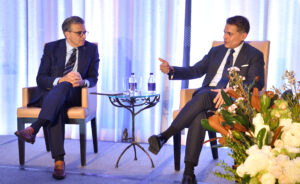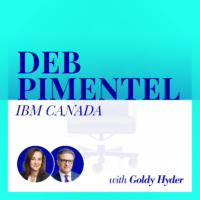John Peller’s grandfather founded the company now known as Andrew Peller Limited in 1961, starting with a modest Okanagan vineyard. Today, the company boasts 12 estate wineries, a range of value wine products, global icewine distribution and more. As leader of a family business thriving well into its third generation, John Peller has deftly navigated a changing industry, business, and family.
“Failure doesn’t mean you’ve failed, it means you haven’t succeeded yet – and the true measure of every person is not how they celebrate their success, but how they respond to their failures and setbacks”
John Peller
Goldy Hyder:
Welcome to Speaking of Business. Conversations with Canadian innovators, entrepreneurs, and business leaders. I’m Goldy Hyder, president and CEO of the Business Council of Canada. Today I’m speaking with John Peller, CEO of Andrew Peller Limited. The company boasts 12 estate wineries, a range of value wine products, global ice wine distribution, and much more. But it came from much humbler beginnings, a rare family business thriving well into its third generation. John Peller has deftly navigated a changing industry, business, and family. Enjoy the conversation. John, great to see you.
John Peller:
Thanks. It’s wonderful to be here.
Goldy Hyder:
Yeah, thanks for doing this. You’re a little bit older than your grandfather was-
John Peller:
That’s right.
Goldy Hyder:
… when this company started out. How many years ago now?
John Peller:
It’s almost 60 years.
Goldy Hyder:
Almost 60 years. He was 58 years old. I’m just fascinated by someone at the age of 58 deciding to start something. Tell me more about your grandfather and how he went about doing it?
John Peller:
It’s an essential moment in time that really transcended not just his life, but my dad’s life and now mine. I always tell people the most important day in my life happened long before I was born. And it was a moment… Actually, back in 1927 when my grandfather and my grandma were in their early 20s, late teens, and they were trying to raise a family and really, really struggling. They had three sons just like I have three sons today. And sadly for them, they lost two of their sons to meningitis and the diseases of poverty. And in a very defining moment in life, my grandma looked at my grandpa and said, “You know, Andy, if you don’t do something, we’re never going to have a family.”
And out of fear and despair, he made a decision he had to leave Hungary. He would’ve gone anywhere, but the only place he could get a visa was to come to Canada. He left by himself. Took him a long time to get to Canada, several months. He got a boat out of Calais in France and landed at Pier 21 in 1927. He did that because he wanted to have a family more than any single ambition. Turned out he was incredibly entrepreneurial.
Goldy Hyder:
Well, they say he’s a serial entrepreneur.
John Peller:
He was a serial entrepreneur. I’ve always believed in my life that we all have entrepreneurial capability, but real entrepreneurs are born, not raised. They have a determination to go forward and they don’t see risks that normal people see. It compels them to try things that are so risky. When you look at the history of most entrepreneurs, they have more failures than they have successes. And that turned out to be the case for my grandpa. He started in a farm, in a grocery store. He had a machine parts business, car dealership, and he eventually developed a very successful brewery in Hamilton. In the early ’50s, he made a significant fortune. And true to his form, he actually had worked for E.P. Taylor in the brewing business. He left to start his own business, and then E.P. Taylor came back to purchase his business to get him out of the market.
With that money, my grandpa started a newspaper in Hamilton, The Hamilton Daily News that was going to compete with The Globe and Mail. And in a very short order of three years, the equivalent of today’s dollars of 150 million that he made, he handed the entire fortune back. At 58 years old, he had now lived an incredible life. Had gone from rags to riches, and he was back to rags. But true to an entrepreneurial profile, he was never going to give up and determined that the best opportunity for him was to get into the wine business. He had been successful in the beer business. He understood beverage alcohol, and from his European roots he really enjoyed the celebration of European culture, food and dining. And he believed that this would be a culture that could thrive in Canada because it was non-existent at the time.
Goldy Hyder:
Your grandfather wasn’t one to just simply take regulations that may have been in place. He took it on and he was a creative disruptor. Tell us the ice story which he’s so well known for.
John Peller:
Yeah, he was naturally an engineer without a formal education. He loved building equipment, and he was really drawn to the process of making beer when he started his brewery, but he had marketing intuition as well. At the time, in Ontario, it was illegal to advertise beverage alcohol. He had a new business and a new brand and no way to get his message across, so he cleverly came up with the idea to start selling ice with the same name. The beer was called Peller’s Beer, and he started an ice cube company so that on the radio on Friday night, Gordon Sinclair, while reading the news would remind people that when they’re off to the party this weekend, don’t forget to take the Peller’s… Then he’d hesitate, ice, at the last minute.
It infuriated the government that they figured someone was getting around their advertising ban. But because there was an ice cube business, they actually made money selling ice blocks and cubes, which was even funnier at the time. But that did come back to bite him in the ass, because when he wanted to get a license in Ontario, there were some people who weren’t as amused by what he did, and that’s why he ended up having to start in British Columbia.
Goldy Hyder:
Yeah, but he had the last laugh, did he not?
John Peller:
I hope so. His legacy was really that failure doesn’t mean you’ve failed, it means you haven’t succeeded yet. And the true measure of every person is not how they celebrate their success, but how they respond to their failures and setbacks.
Goldy Hyder:
Let’s talk about that a little bit more. You talked a lot about risk there. How do you think he’d feel today about the risks that you’re taking or not taking, and the risks that Canadians take and don’t take in the environment in which we operate today?
John Peller:
The biggest issue is that he didn’t see risk. It’s very easy not to want to try or do something. My dad and I have always reflected, even though my dad was really the person who ended up building the company, that in the same circumstances we would’ve never done what he did.
Goldy Hyder:
It wasn’t safe.
John Peller:
It wasn’t safe. In fact, back in 1960, the year we started, there was no wine industry in Canada. There was no wine industry in North America at all. 80% of the wine sold in Canada was sherry and port. Table wine was a micro segment. As it was in the US. In the late ’60s, you had Mondavi’s Sebastiani’s, Paul Masson, Taylor Cowlett. They were jug table wines. The problem was people didn’t drink wine. They drank beer and they drank whiskey with coke and ginger ale. Trying to start a wine industry or a wine business when there wasn’t really a developed segment turned out to be the first challenge to overcome. In fact, he struggled mightily in the early years and within three years the banks were about to call his loans and take him down. He had borrowed money from my father, Joe. My dad got into medicine in his teens. He went into U of T at age 16.
Goldy Hyder:
You got great genes.
John Peller:
There you go. Well, one of the interesting things about that was my dad was the opposite of his father. He wasn’t an entrepreneurial driven businessman. He was an academic. He loves science. He was drawn to medicine early in life and felt totally career fulfilled. He was the chief of medicine for all Hamilton civic hospitals. He was an internist and he was happy. He had to borrow $5,000 from five other doctors to help get my grandpa’s seed capital to start the winery. When things all of a sudden started to go poorly, the bank called my dad and said, “We’re going to have to take this business down.” And my dad said, “How about if I come out and try to help for a couple of months?” And they said, “You better go quickly.” In fact, he did. He had six children of which I am the third eldest.
I remember I was in grade 3 at the time. We got on a train on Front Street in Toronto and went right across Canada with my mom and dad. My dad wasn’t naturally set out to be a business person, but he was a very good listener and he was very smart. He had more of an aptitude for people and organizational management than the driving bull my grandfather was. He quickly at least settled things. They stumbled into what became an incredibly precursor to the establishment of the wine industry, which was a sparkling wine boom. North Americans liked all their beverages cold, sweet, and sparkling. Trying to sell them dry table wine was totally out of context. They drank their whiskey with coke and ginger ale on ice, right? They drank beer cold and sparkling. The sparkling wine boom allowed to introduce wine to people in a cold, sweet, sparkling format. And all of a sudden it took off like their…
Goldy Hyder:
This is the Baby Duck story, basically?
John Peller:
This was the Baby Duck and Shantae and Spumante and a whole boom of sparkling wines. But principally Baby Duck was the product that transcended the category. Today, no wine brand has a one share in the marketplace. Baby Duck had a 25% of the entire wine industry. It was huge.
Goldy Hyder:
Big duck, maybe not a baby.
John Peller:
There you go. When we look back at it, fortune has a way of favoring those in the right place at the right time.
Goldy Hyder:
Is it fortune though?
John Peller:
What we laugh about in my family now is that my grandfather’s dream of building a wine business, it was a great vision, but he was 30 years too early. It didn’t really happen until the early ’90s here, in Canada. But once you get started, you need to find ways to survive and to be entrepreneurial and look for opportunities in the market. There’s always fortune and good luck that needs to come your way, but it’s through hard work and working as a team and having good intuition and doing good research to find opportunities. And those things at some point, if you’re lucky, come together and off you go.
Goldy Hyder:
Take us through the challenges in the ’90s in terms of how the industry dealt with adversity and turned itself around. And we are seeing right now out west the challenges the oil industry is facing. Are there any lessons there?
John Peller:
I think it was a stark realization that we came to, that we either became a wine industry that bought imported wines into our country or were we up to making an enormous commitment and investment to cultivating a new industry. Because most of the grapes that we had were not the right grapes. The equipment we had was not up to best practice, best standards. The incentive came because we did plant grapes in the mid ’80s. And early on in the ’90s we started making wines that won best in show prizes around the world, and there was an aha moment that, “You know what? There is a great future here.” Just as areas like Chile, Argentina, Australia, New Zealand and Sonoma was discovering their ability to grow great grapes because most of this happened in a very, very short period of time. The new wine world was really a function of the ’90s and the early 2000s.
Goldy Hyder:
As I spend more time with those who come from family businesses, you really come to appreciate that era. The people who, as you said, like your grandfather came with nothing, built something from the ground floor up. They took risks. They were ambitious. They took full advantage of everything that Canada had to offer. But as time passes, I wonder if the country’s culture doesn’t really lend itself as much anymore to people like your grandfather coming here and making a go of it.
John Peller:
Well, I’m certain that what you’re saying is true.
Goldy Hyder:
Isn’t that sad?
John Peller:
It is, but it’s the inevitable consequence of maturing markets, maturing political systems, maturing structures. You look at our wine industry today, it’s becoming incredibly bureaucratic, and our biggest challenges aren’t the disruption of technology, they’re the disruption of government. They’re all well-meaning ambitions of government. But in the end, whether they’re taxation, they don’t allow us to trade across provincial barriers, they negotiate international trade agreements that favor people who import against us. We have to be a lot smarter about how we become competitive in the market today. In the older days, the market was freer. People could move easier. In some ways you can procure… Capital easier these days. There are things that help facilitate business, and this is an era of opportunity, but it’s certainly different than it was in the past.
Not to mention global competition. The thought of people transporting goods around the world 40, 50 years ago was different. It happens in a nanosecond today. It’s a much smaller world, it’s a much competitive world.
Goldy Hyder:
How does Canada compete in that world?
John Peller:
In simple terms, they must be committed to be as good as the best in the world. It’s an easy thing to say, but it takes a lot to understand. In the end, business is about people. It’s a people sport, and people need to be smart, motivated and competitive. You need to know what best practices are around the world and you need to be absolutely determined and committed to win. And it’s not just the people, the systems that support business need to support investment and the like. We’ve done well with some things in Canada and we struggle with others. It’s still a decent record, but it needs to change with the times. In the ’60s and ’50s and ’70s, being the best in Canada was good enough and now it’s not good enough because the best in the world is in our marketplace and we need to be the best at what we do to compete and survive.
Goldy Hyder:
Let’s talk about your journey here because it wasn’t a straight line. For that matter, neither was your dad’s as you just shared with us. He came from being a doctor. Why is it that you didn’t just jump right into the family business? And tell us a little bit about how you got here.
John Peller:
I have developed a real passion for family business as an area of subject matter and understanding and research. When I look back at when my grandpa arrived, it was to build a family, but he fell in love with Canada and he loved business. All those three things have turned about to be the focus of my life, where my grandfather was damned and determined to build a family business. My dad was very different about his approach. He wanted us all to have the opportunity to find our own way in life, to follow our own dreams, and he was very anxious about making a family business a destiny for the family. In fact, my four brothers and sister have a very broad scope of interest. I have a brother who’s a doctor, brother who’s an artist in New York City. My brother, Jim, was a farmer.
My youngest brother was an actor. My sister lives in Halifax and she went into marketing. All of which to say was, I think, my dad kept an open mind as to whether he would want to go forward in a family business or not. I end up going into law and practiced law for a bit. I liked business and I eventually left law and got into consumer packaged goods, moved to the United States, worked for Nabisco for five years, met my wife Diane, and all of a sudden Canada was in the free trade negotiations in 1988 and the prospects for our wine industry were very poor.
It put my dad in a position where even if he wanted to sell the business, he couldn’t really sell it at the time because the valuations were very, very poor. He was getting close to my age now at age 60. I think he was 63, and he just called me one day, he said, “Why don’t you come back and help me for a couple of years and we’ll see how things go?” I said, “So long as my siblings were supportive.” And they were, “That I’d come back and we would see how it goes.” I came back in 1989 and we started with a clean slate and it was a turning point for our wine industry for sure.
Goldy Hyder:
Now, you mentioned that your father took the approach of allowing his children to explore whatever it is that they wanted to do and become the best that they could at it. You’ve got three boys.
John Peller:
Right.
Goldy Hyder:
Any of them going to be in this business? Is there a fourth generation to the Andrew Peller story?
John Peller:
Well, certainly the potential is there. My five siblings are still shareholders in the business with me today. And I would say a defining moment in our life was starting a family council. In other words, we were a public company. We had a board of directors that ran the business. But families need to make sure their families learn and grow parallel with their business so that it affords the opportunities for people to participate, whether it’s in an active operating role or as an advisory role or to help the family deal with all their challenges. Because in the end, it’s a recognized phenomena, what takes family businesses down over generations is not the business, it’s the challenges of the family. And there are many.
Goldy Hyder:
Most don’t get past the second generation.
John Peller:
It’s easy to understand. Eventually people grow up and start their own families and their priorities start to head in separate tracks. What’s fascinating about family businesses is where businesses thrive on analytical planning and data, families run on relationships and emotions. Bringing all the emotional relationship challenge of the family onto a business as a total different dimension and it behooves you to not underestimate that challenge and work hard on your family. This was a study that really began in Harvard in the 1990s. Davis was the name of the professor. What he quickly discovered was that when you look at how businesses solve problems, they have a very rigorous process to analyze what their issues are. How they organize people to make sure the people are right. They have defined issues, they have transparency of communication. All in order to make better decisions. He then looked at what a family does to plan their life and solve their issues. They have none of that.
They rear children to their teens and then people go their own way. What they reintroduced to families to address this shirt sleeves to shirt sleeves in three generation was the opportunity to reflect some of this best practice to help the family learn. Meet together as a team. Define what your vision and issues are. What are the values that inspire you, and importantly to recognize that in a family your capital isn’t just financial. It’s moral. It’s intellectual.
Goldy Hyder:
And emotional.
John Peller:
It’s emotional capital and it’s financial capital, so that there’s often opportunities for people to participate in many different areas. And that needs to happen for the family to learn and grow as a team.
Goldy Hyder:
Is it about building consensus or it’s just building majority support in the family to do certain things?
John Peller:
I think it’s all of that. It’s, for example, building leadership capability and showing people that even if they’re not making all the decisions, supporting leaders is a critical part and having similar missions. In many families and like ours, we want to make sure family members have the opportunity to stay if they want, and if they choose to want to leave that they can go their own way and that we support and endorse that. It’s making sure you have a collection of the willing and motivated, not forcing people to be part of something that they don’t want. That’s a long way to answer your question. Our family is in a great spot to go forward. Now with my five siblings, we have 14 nieces and nephews. We meet twice a year.
Goldy Hyder:
Do you chair that meeting or somebody else comes in to chair it?
John Peller:
We definitely engage outside people to administer and facilitate our meetings. Independent advisors are critical to family businesses. You need people to help moderate your conflicts and to bring fresh perspectives in. It’s been an amazing journey. By far, the most challenging and rewarding journey of my life has been the family council that we started in early 2000. And if we hadn’t started back then, my parents have passed away in the last five years, we would never have made it through that generational transfer. The challenges of life would’ve forced us down a different road, but we were ready for it. We had talked about the opportunities and our commitment to stay together. I think now the issue is what will the next generation want to do? And that decision will be theirs.
Goldy Hyder:
And you become a student of family businesses. I found that very interesting coming from a family business background myself. Why did you do that and what have you learned from it?
John Peller:
One of the most incredible moments of my life was when I came back in the early ’90s for three years, I was the head of sales and marketing. My dad came into my office one Friday afternoon and asked me if I had a few minutes. I said, “Dad, come on.” He said, “John, I’ve been doing a lot of thinking.” And he said, “You know what? I think you’re the right person to lead this company.” I was 35 at the time, and I looked at him surprisingly. He said, “You know what? There can only really be one leader at the top, and I’m sure right now that right person is you.”
Goldy Hyder:
Did you ever think that that day would come or were you thinking it would be one of your older brothers?
John Peller:
I hadn’t even anticipated the discussion. It never came across. A lot of families struggle with succession. My dad was humble and he looked at it as best he could. He told me by the way, he said, “John, I want you to know that from now on whatever decision you make, I’ll support you.” But he says, “You’re going to get my opinion whether you want it or not.” And he smiled and he came across the desk and he gave me a hug and a kiss on the cheek. He said, “You know what? I think you’re going to do a great job.” And walked out the room all in like six minutes.
Goldy Hyder:
Get back to work.
John Peller:
And we did. We worked together for the next 10 years, and we had an amazing journey. In the early 2000s, he was now more retired and some of the challenges of family started to become apparent. People going their own way. Lots of challenges in the family.
Goldy Hyder:
Maybe disagreement about the direction of the company or…?
John Peller:
Not so much, but it was family issues that were weighing in. And I went to him because one of my friends went down to Harvard to take an executive management course, and he came back with this deck on best practices and family enterprise. Family Enterprise is now taught at every university in Canada, Toronto, Western Sauder in UBC, McGill. They all have family enterprise programs, because it is a robust area of study now. I took that to my dad and I said, “Dad, I really think we need to bring our family together to talk about all our issues.” And he said, “John, remember I told you you run the family business?” I said, “Yes.” He goes, “Well, I run this family.”
He was afraid to make that change. He did. A month later, he came back to me, he goes, “I’m 100% sure you’re right. Let’s go.” It a platform of new learning for everybody in our family, including him, including me. We had to work on strengthening our relationships. Even my kids who were in their late teens and 20s at the time, going through the same things we would do as business executives, they found the whole thing hysterical, because it was so out of the context of what a normal family does.
Goldy Hyder:
Real life soap opera.
John Peller:
There you go. And yet, over time it takes root and learning is a commitment to a process and it’s a journey. And it’s been by far the most exciting journey for me.
Goldy Hyder:
Now, some of your competitors in the industry. Recently we saw Constellation Brands make a very big investment in the cannabis space with Canopy. Is that something that you’re considering or would consider or have you ruled investment in cannabis out?
John Peller:
Well, it’s obviously something we monitor very closely. Cannabis is probably one of the greatest disruptors in business, politics, and I think in health in the last 50, 75 years. It has been a very significant event. One of my concerns with the product, I’m sure you’ll appreciate, and we talked about government disruption. One of the challenges in the wine industry is that we are heavily taxed. This was really the responsibility of… Since prohibition, the finance departments realized that defining our product as a sin allowed them to increase taxation on it. And in Canada, we’re the most aggressive tax policy on wine because in France there’s no tax on wine. In the US there’s a little tax. We are five times which most people tax their product.
Goldy Hyder:
How does that impact your ability in Canada to grow your business, invest, create jobs?
John Peller:
Well, it’s totally profound. It makes the price of the product extremely high. The government wants to set up arbitrary control of their product so that they can collect tax. When we produce a bottle of wine in Niagara, instead of being able to just ship it right to a retail store, we have to ship it to an Oshawa warehouse that the government owns so that they can put taxes on it, right? In other words, can you imagine if you lived in Bordeaux-
Goldy Hyder:
Sounds like a middleman.
John Peller:
… and you wanted to ship wine to Paris and someone said it’s going to go through a government toll booth first, there’d be a revolution worse than the French Revolution. Now they’ve introduced cannabis and they’ve put hardly any tax on the product at all. They have this bizarre circumstance now where wine drinkers are now subsidizing pot smokers and it’s totally unreasonable and unfair, but it’s going to force government to look at legacy policy and rationalize it in the context of a new product that it’s hard to say that cannabis should be treated more favorably than wine.
Goldy Hyder:
Yeah, it’s certainly a theme I hear a lot from CEOs in a variety of sectors in Canada, and that is the need for a, quote, “Level playing field.” Unquote.
John Peller:
Right.
Goldy Hyder:
Seems to me like you’re saying the same thing?
John Peller:
I am. I’m sympathetic. I’m not a government hater, like so many people. It’s populist politics, paint government as evil forces. I don’t subscribe to that at all.
Goldy Hyder:
What’s the role of government in your mind?
John Peller:
I would say this, the big challenge of governments is that once they do something one way, they struggle to change. They’re not dynamic. They’re not progressive, because all of their practices are designed to maintain a status quo. I think that’s a profound question. What is the role of government?
Goldy Hyder:
Peace, order and good government.
John Peller:
And it needs to change with the time. For our system to offer the lifestyle and the education and health goal ambitions we have, we need a competitive business segment to raise the value of the wealth to pay for it all. And increasingly the challenges are… And this may sound cynical, but I genuinely believe that governments at the provincial and federal level are increasingly devaluing business and not doing as much as they need to do to allow businesses to thrive. A good example is the discussion around free trade.
I was always against calling free trade, free trade, because it is an anomaly and it’s an oxymoron. There is no trade in the world that is free. All trade comes with rules and regulations, and those rules and regulations are policies that either favor or not trade of a certain kind. For example, we’re looking out here over the Ford auto plant here in Oakville. A lot of people said the government never should have provided support to the auto industry. Well, they did, and they did it wisely. And it is now a cornerstone economic foundation block of our country. And because we had autos, we ended up having Magnus and Linamars. The bottom line is, to win in business, government policy needs to support business practices in a country and no one understands this more than Americans do, the largest subsidizers of agriculture in the world. They subsidize and support all their technology businesses, their Boeing, their airspace through their military.
It’s important that people not take the view that government shouldn’t support businesses. They need to. They need to and in an intelligent and productive way. It’s easy to have business policy that throws money into horrible ideas and subsidizes poor practices. That is not what the goal is. The goal is to make sure policies are designed to support people to invest, to be rewarded, give them incentives to invest their capital and ensure that your policies are producing best in business outcomes, not worst.
Goldy Hyder:
Let’s pivot to outside of Canada. You’re a global company. Just take it through some of the markets that you’re operating in.
John Peller:
We have a very successful ice wine export business that we participate in. It was important to us to the export businesses and all products around. Doesn’t matter what segment you’re in, export business is very difficult. Business policies in home countries support their local businesses and there’s incredible competition. You have to really be on your game. For us, we wanted to focus in an area where we knew we did something better than everybody else in the world, and that is make ice wine. We make great $10 Chardonnay and $20 Chardonnay, but there isn’t a real demand for 10 and $20 Chardonnay around the world because everyone is awash in those products.
Finding areas where you can develop and maintain competitive advantage over the long term is important. We also compete in the home wine making segment. We make wine kits where people make wine at home and we’ve developed a capability and we also compete in that segment globally. We do place premium wines in the best restaurants in London and New York City and Tokyo and Beijing, but we really focus on products and segments where we know we have best practices and we’re patient. It builds slowly over time, but it’s become a very successful business and it’s going to be incredible in the future.
Goldy Hyder:
Now you’ve mentioned some of the challenges that the business is facing. Issues like interprovincial trade barriers, taxes, just some of the challenges that governments perhaps even unknowingly impose upon businesses. How are you going to battle through that and why?
John Peller:
Wine has been growing and gaining share of beverage alcohol. We’ve had very, very strong growth in the wine business for the last 20 years, and it’s projected to continue for the next 20. Naturally it has some competition now from potentially cannabis, but our product is very different and as we’ve invested in making better wines, it’s opened up new business opportunities. We have restaurants and hotels. We hold special events. We are not just investing in wine, but in craft spirits, in craft refreshment, not just beer, premium craft beers, wine and craft beers. The segment is really going through an explosive innovation phase and the demand for products in Canadian craft refreshment looks very, very strong.
Goldy Hyder:
Your father treated philanthropy as very important to him and the company. Tell us what you’re doing now on that front.
John Peller:
It’s something that we’re genuinely passionate about. Being a Canadian company, we have a facility in Nova Scotia. As I said, we have many in the West and many here in Ontario. We participate broadly in all the local charities, in food banks, in helping hospitals, in scholarships at university. We really encourage everyone in our company not just to give money or looking at charity as a way to give money, but to be meaningfully volunteering and being engaged in your community. That’s our ask of our people. We’re tied significantly to the We Foundation in Toronto with Mark and Craig Kielburger, and we participate in their local activities. We’re also now building a small medical college in Kenya. My dad was a doctor, my mom was a nurse, and it felt really right to me and my brothers and my sister to provide a medical gift to people who are born without advantage or have nothing. We’re actively involved in that and it’s a big part of who we are and it’s as fulfilling as anything we do.
Goldy Hyder:
Well, I’m sure that would make your grandfather and your father proud. Now, your father was also known to be a very prolific reader. Are you?
John Peller:
Truthfully? I am. I’ve always enjoyed reading.
Goldy Hyder:
What are you reading?
John Peller:
I probably have eight books on my nightstand.
Goldy Hyder:
I guess that qualifies as prolific.
John Peller:
I’ve always liked biographies and I read 90% nonfiction. I only read fiction if one of my dear friends promises me it’s extraordinary.
Goldy Hyder:
You should read The President is Missing. I just read it. I’m like you, 90% biographies, but I just read it. It was a good book.
John Peller:
I will. I’m reading Napoleon’s biography now and Leonardo da Vinci’s biography, which are incredible. I still play hockey and obviously with friendship with Wayne. I’m reading Cujo’s book. Cujo sent me his book and I’m absolutely enjoying.
Goldy Hyder:
You should read Killer too, by the way. It’s another good book with Doug Gilmour.
John Peller:
Doug Gilmour’s book is up there.
Goldy Hyder:
I, of course, liked him because he was a Calgary Flame when we went to Stanley Cup.
John Peller:
Of course. All my friends and I are reading Sapiens. I’m sure you’re reading that. I just really love to read an hour or two a day is what I try to shoot for.
Goldy Hyder:
You had briefly touched on the notion of disruption and really not being hit by disruption as much as other businesses are. What are some of the challenges in your business in terms of looking forward where disruption could be an issue?
John Peller:
Well, there are many. And the fact that our business is so competitive, we have… The LCBO has over 30,000 wine skews in their inventory, which is completely mind-boggling, right? A US grocer might carry 1500 wines. Costco might carry 1,500, 2,000. They have 30,000 of which 29,000 of those 30 are imported. Only 1,000 are from the local industry. That creates quite a competitive challenge for us. There’s many other things. It’s not that technology doesn’t impact our business, clearly it does. We have progressive data cloud-sourced systems that run everything in our business. We’re progressive with supply chain management, how we understand consumer trends, direct market media. We use drones in our vineyards. We put probes in the earth to monitor soil moisture. Everything we are doing to make wines better quality and to get better yields at more efficient prices. There’s so much technology involved. That’s keeping-
Goldy Hyder:
All good for the customer.
John Peller:
All great for the customer. It’s one of the things that people don’t appreciate. It was always fashionable to put low price table wines down in the ’60s and ’70s. They called it plonk. Most of it was often bad quality because it was wine that sat in warehouses in Europe and deteriorated and got shipped here 10 cents on the dollar. Today, the wines people drink at 8, $9 are part of a very progressive supply chain. Just-in-time quality management around the world, and the wine quality 8 or $9 is really good. It can be better at 15, 20 and 25. It doesn’t stop that from happening. But a lot has happened technologically to ensure the qualities of the product are much better than they’ve ever been. I think looking at that, one of the biggest disruptors is climate change.
It’s creating havoc around the world. Every year, every continent is having different storms, hails, freezes. In the best sites in the world for growing grapes temperatures are getting too hot. Grapes do not like temperatures over 27 degrees Celsius. In Napa, they’re now having many days a year, 35 and at 40. There are many people very concerned that Napa’s future as the prime growing region is in jeopardy. Similarly, with floods, freezes, there are so many challenges. Fortunately for us, we’re in a zone that will benefit from a bit of global warming. But with those benefits, there are other vagrancies and challenges. I would tell you as well that it’s government disruption that is a very big issue of ours. We can ship a gun from one end of the country to the other, but we can’t ship a bottle of Chardonnay. It’s bizarre.
Goldy Hyder:
Only in Canada.
John Peller:
Only in Canada, and we trying to get the government to look beyond its tax needs. I am sympathetic to… We’re here in Ontario today. Our Ontario government, whether it’s liberal or conservative, is broke. They have not enough money coming in to meet the commitments that they’ve made.
Goldy Hyder:
Well, it’s so broke that it’s, in fact, the largest sub-national debt in the world, is Ontario.
John Peller:
That’s horrifying. And every year a new government comes in and wants to raise casino lottery and beverage alcohol taxes as if this is some kind of a solution. It’s not.
Goldy Hyder:
[inaudible 00:42:13] taxpayer at the end.
John Peller:
Learning to find better ways to develop investment and support and revere and honor business investment and development, we seem to be constantly being traded off against other bureaucratic goals and objectives.
Goldy Hyder:
How concerned are you? It’s obviously an important issue for business, but it’s an important issue for nation building. It’s an important issue for the country. It’s an important issue for sustaining our social and economic programs that we have here. How concerned are you about our ability to attract that capital into the country?
John Peller:
Well, to put it mildly, I’m incredibly concerned. Obviously, this isn’t a challenge that’s uniquely Canadian. You can see south of the border, the politics are becoming increasingly disruptive, disorganized and uninformed. You look over at Europe and not just with Brexit, two thirds of the countries in Europe are bankrupt. Canada on the other hand, has some of these challenges but has so much more going for it. And the question is, are we committed to dynamic learning and growth and change? The provincial federal structures that got us to where we are need to be rethought in the context of how people live now in larger cities in terms of knowledge economies. But we still need manufacturing bases here.
In other words, to have everything we have get made in the US or get made in Asia is not a winning formula for us. And other countries don’t do that, yet our country seems satisfied that we’re losing plants and production all over the place. I think governments need to do more to support people who want to give jobs to people in this country. It’s a very challenging… They get government jobs. They get hospital. They get education. But business jobs, they have less insight into how to build the policies and structure to support them. And if we don’t get that right, we will hollow out the value creating in this country.
Goldy Hyder:
What’s the brand of Canada then? In terms of both the positive, but where there’s room for improvement? I’m sure you’ve got some thoughts given where you operate in the world.
John Peller:
I think Canada’s brand is an obvious one. Canadians are civil. They’re respectful. They’re concerned about the needs of people in their community. They distribute income in a compassionate and intelligent way. When you look at the countries in the world who are thriving and who are the most satisfied, Northern European countries, Switzerland, Canada are always at the top of the list. I think those are strengths that we need to maintain and I think we do well at educating generally. I think our education system, certainly compared to the US, is far superior. Yes, they have some elite universities that are the best in the world. Thankfully, so do we. But our primary and high school education and vocational college training, it’s accessible to everyone. And our healthcare is positive.
I think we have to look at ensuring that government continues to perform efficiently. I know this is a painful subject for people because it means that there’s potential job loss there. Artificial intelligence is going to put enormous pressure on all aspects of education and healthcare, and bureaucracy to reform. And we have to make sure we accommodate that progressive change and rethink how we do things, which as I said before, sadly, is government’s biggest challenge. Trying to do things differently than the way they did them yesterday, is hard for them.
Goldy Hyder:
Now you’re a CEO. I have the great privilege of working with some Canada’s leading CEOs, 150 or 160 of them, and there’s a perception about CEOs, right? Do you think it’s fair?
John Peller:
Well, I certainly appreciate that when you look at a corporation, it’s a notional construct. And media talks about corporations in a way that’s not human. They’re not people, they’re-
Goldy Hyder:
Entities.
John Peller:
Entities. And they have a profit incentive and-
Goldy Hyder:
Shame on them.
John Peller:
… they create hardship and change jobs for people. There’s a very cold, harsh reality side to competing around the world with your ideas and your products. It’s natural for people to fear at times and be concerned about the ethics and values that corporations operate under. I think it behooves us as a business community to speak out more about what our goals and ambitions are. Nothing’s more comical than… By the way, when you look in the US today, the top 200 or 300 CEOs in the US have all recommended that the government raise their taxes. Every one of them. But their agenda is not being heard. I think CEOs generally are mindful of their responsibility to the people that work for them. They want to create thriving communities and competitive businesses. I’m proud of nothing more in my life than the fact that we support thousands of families.
Goldy Hyder:
How many employees now?
John Peller:
We have just over 1,500 employees across Canada.
Goldy Hyder:
There’s usually a multiple attached to that?
John Peller:
Right. We always talk about it in our company. We are grateful for the thousands of people who work so hard that we had the luxury of being in the business we’re in today, and we want to make sure we hand that opportunity onto the next generation. It’s an incredible contribution. And when you look at Niagara, it was a Rust Belt engine economy from the ’70s, and it’s completely transformed now. It’s a thriving cultural, agricultural, tourism and commercial industry. And it is a great future. We’ve been part of that and it feels great.
Goldy Hyder:
Something tells me your grandfather wouldn’t have enjoyed the disruption of government as much as we’re tolerating it. Let’s talk about leadership just before we wrap up here.
John Peller:
The first thing that comes to my mind is definitely core values, honesty, transparency, and holding others in respect. Then the key thing is inspiring others to learn and grow. I believe the greatest fulfillment in life is learning and helping others learn and grow, and really building a culture that reveres that, creates all opportunities for you. I told you in my life, I’m anxious to see leadership development in my family, in my business, and in the community. We participate in all those fields. It’s funny, when I was over in Africa working with that medical school we’re working on. We’re on safari, the guy was explaining to me how often in the lion pride, it’s not just one lion that rules the roost, often he forms a coalition with two or three other males to run the pride. I think there’s a sense that leadership in the community is one person doing something all the time. It’s people working together and providing leadership as a team, that’s really critical.
Goldy Hyder:
That’s a great place to wrap, because I was going to ask you what advice do you have for future leaders? I think you just gave it. Now we like to end the segment with a little wordplay. I say a word or phrase and you tell me what first comes to your mind.
John Peller:
Please.
Goldy Hyder:
Family.
John Peller:
Life.
Goldy Hyder:
Entrepreneurs.
John Peller:
Innovation.
Goldy Hyder:
Social media.
John Peller:
Immense learning opportunities.
Goldy Hyder:
Globalization.
John Peller:
Mixed bag.
Goldy Hyder:
Government.
John Peller:
Reform.
Goldy Hyder:
Canada.
John Peller:
Best place to live without a doubt. I’d love to tell you a story if I could on that.
Goldy Hyder:
Please.
John Peller:
My grandpa passed away in 1994. My dad and I had looked after his affairs, and when we opened his will, we were surprised to see that he had a handwritten note that he wanted his ashes placed in the mouth of the Halifax Harbor. We were initially surprised because he never lived in the East Coast, but then it was clear to us why he did it. He wanted to pay tribute to the greatest day of his life when he came to this country with nothing but full of hope for a better life for his family. Naturally, not just my grandpa’s ashes are there now, but so is grandma’s and so are my parents. It helps bring together everything that’s important in my life, creating a better life for my family, and working hard in business and being grateful to live in a country like Canada.
Goldy Hyder:
Thank you. Thank you for sharing today. I appreciate it.
John Peller:
Thank you.
Goldy Hyder:
Thanks again to John Peller for being my guest on this episode of Speaking of Business. Subscribe now for more conversations with Canada’s top innovators, entrepreneurs, and business leaders. Search Speaking of Business wherever you find podcasts, or visit speakingofbiz, that’s with a Z for Canadians and a Z for Americans, .ca, to join our email list and follow us on social media. Until next time, I’m Goldy Hyder.














